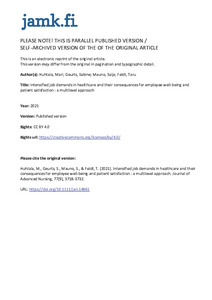Intensified job demands in healthcare and their consequences for employee well‐being and patient satisfaction: A multilevel approach
Huhtala, Mari; Geurts, Sabine; Mauno, Saija; Feldt, Taru (2021)
Huhtala, Mari
Geurts, Sabine
Mauno, Saija
Feldt, Taru
Wiley-Blackwell
2021
Julkaisun pysyvä osoite on
https://urn.fi/URN:NBN:fi-fe2022022220424
https://urn.fi/URN:NBN:fi-fe2022022220424
Tiivistelmä
Aims Intensified job demands (IJDs) and their effects on employee burnout, work engagement and patient satisfaction were investigated across different work units and occupational groups in a healthcare setting. Design A multilevel study. Methods One thousand twenty-four healthcare employees responded to a survey in 2019 and rated their experiences of IJDs, burnout and work engagement. Nine hundred fifty-one patients rated their satisfaction with care received from healthcare staff. Results Work units and occupational groups who shared more experiences of increased time pressure and multitasking reported higher exhaustion. Shared perceptions of increased planning and performing one's work autonomously correlated with higher exhaustion and lower patient satisfaction at the work-unit level. Moreover, work intensification was found to be highest in emergency care and among nurses, while job-related planning demands were highest in leadership services. Conclusion IJDs are a shared risk to employee well-being among heterogeneous healthcare staff and relate negatively to customer-rated patient satisfaction. We found that high time-pressure demands increase the shared risk of burnout—especially among nurses and healthcare staff working in emergency care. Furthermore, increased independence and self-determination in planning and executing work tasks also increase the shared risk of burnout especially among those in leadership services. This can lead to lower customer/care satisfaction among patients. Impact With the accelerating pace of socio-economic change, the pace of work is also getting faster. Our findings help understand how IJDs are experienced among heterogeneous healthcare staff. Because different occupational groups and work units had different demands, this research shows that attempts to mitigate the negative effects of IJDs need to be planned and implemented in a context-specific way. It seems crucial to pay more attention especially to adequate nurse staffing so that the adverse effects of IJDs could be mitigated among them.
